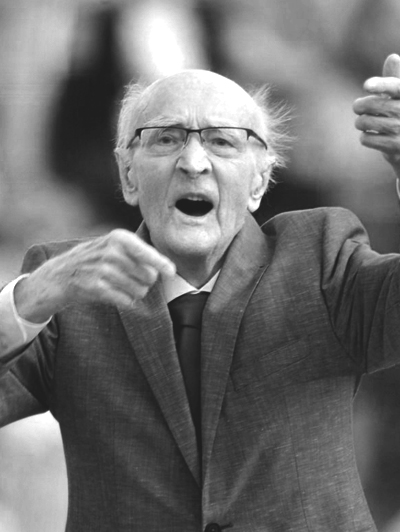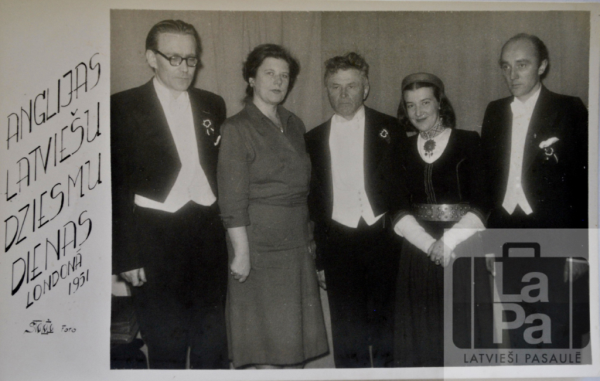Roberts Zuika
1913–2015
Conductor, music critic, publicist
Born on 20 January 1913 at the Ambati homestead, Lube Parish. Studied at the Rīga Teachers’ Institute (1930-1935), Valmiera Music School and Liepāja Music School. Subsequently, started his teaching career at the Kocēni (then – Kokmuiža) parish primary school and with great enthusiasm directed choirs in the Kocēni, Lieziere, Liepāja and Valmiera areas.
The conductor’s inexhaustible desire to gather together choristers is evidenced by the fact that, even in the circumstances of war, in 1944, he founded and directed the Rīga 2nd Battalion Soldiers’ choir (later renamed the Zuika Choir) in Dundaga. Rehearsals even continued when the soldiers arrived at the Putlosa refugee camp in Northern Germany. Alberts Jērums writes, with melancholy humour and full of admiration: “Zuika, where others have given up, has already found a place for rehearsals and herds his starving choristers together so that they can once again sing ‘those who are still alive, those who are still alive’”. (Grauzdiņa, Ilma, Izredzētie (The Chosen Few), 2008, p 289).
Having performed some 170 concerts during the refugee-camp period, the choir’s core moved to Corby, England in 1947 and continued to perform. In 1950, Zuika himself was reunited with the Zuika Choir, enjoying eleven productive years: under his leadership, the choir performed at the Latvian Days of Song in England, in BBC radio broadcasts, won laurels at international choir competitions. “And Zuika’s male choir is historically the first Latvian choir to participate and win a high place in an international choir contest,” relates historian Arnold Klotiņš. “This was in Wales in 1953. ... Under the most difficult and thankless circumstances, this man was able, with songs, to rise above, to maintain his convictions. ... This was a man who never stopped, he had extraordinary energy. He created an atmosphere that elevated the people around him. He had this saying – only what you have given remains. It can be said that he has given a lot of himself.” (Rozenberga, Māra, Choir conductor Roberts Zuika passes away at the age of 102. Lsm.lv. 6 February 2015)
In 1961, the artist’s path as an exile took him to America. In his new abode too, the conductor founded and directed choirs – the Detroit Latvian Choir, the Kalamazoo and Grand Rapids male choir (from 1966), and later the Kalējs (Blackmith) combined male choir. The Garezers Latvian centre became the apple of the conductor’s eye. In 1960, Zuika himself launched the tradition of organising youth music camps, courses for young conductors, massed choir concerts, musical performances and the Garezers Days of Song.
Also worked as a music critic, taking over the editorship of the Latvian Music magazine after the death of Valentīns Bērzkalns, (1977-2015).
From 1990, his connections with Latvia intensified, and the conductor actively participated in the Latvian music scene, including conducting Song Festival concerts in Rīga.
A chief conductor at the XXth-XXIInd All-Latvian Song Festivals, Honorary chief conductor at the XXIIIrd-XXVth All-Latvian Song Festivals, chief conductor at Latvian exile-community Song Festivals and Days of Song in Toronto, Cleveland, Boston, Chicago, European Song Festivals in Hannover and London, 32nd Latvian Arts Festival in Australia, as well as many other major choral concerts.
Received the Order of the Three Stars (2003), the World Federation of Free Latvians Award (2004), was a member of the USA Council of Latvian Choirs.




















